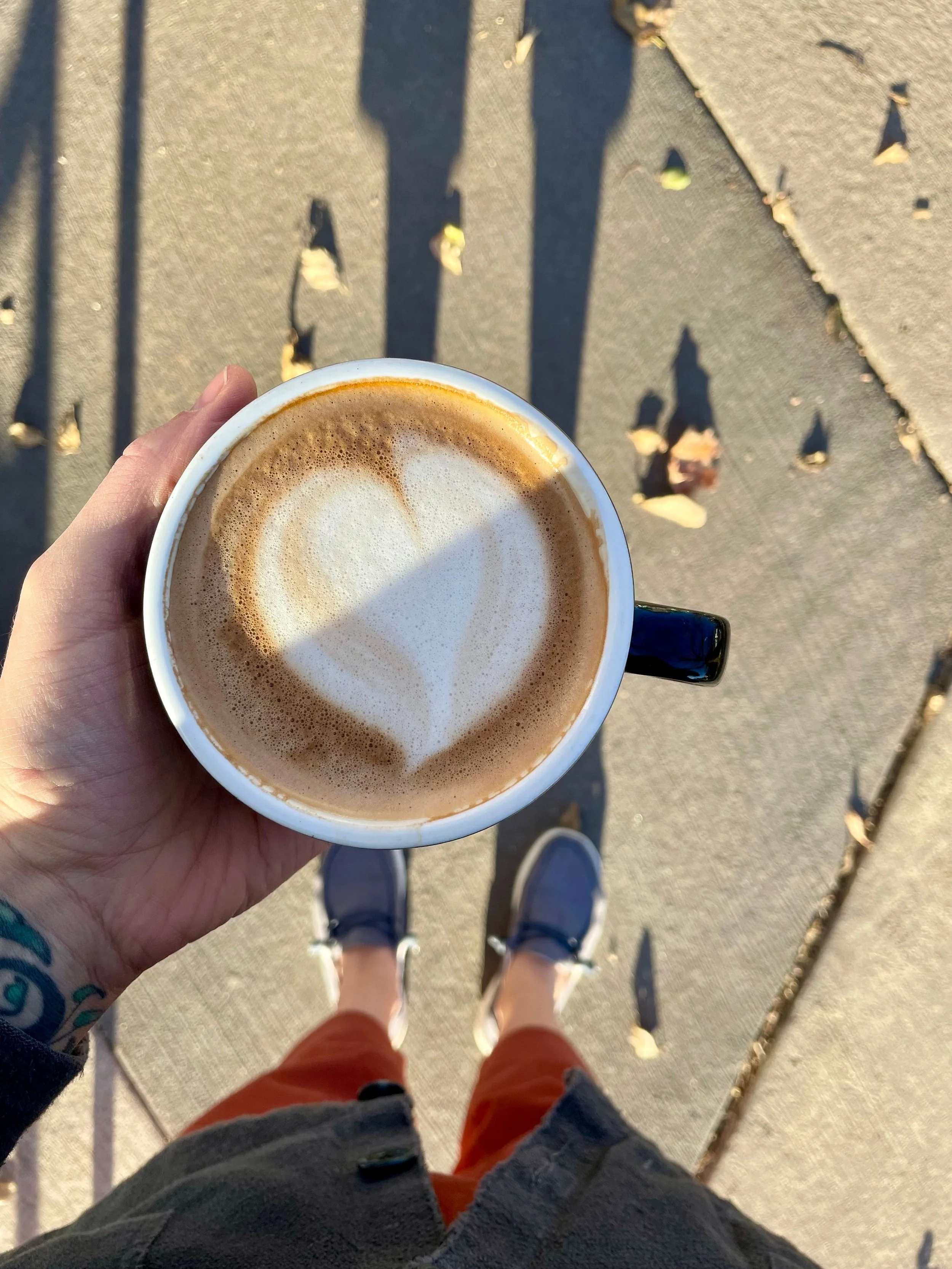Beyond the First Heart: Mirah’s Story of Growth
The espresso machine hisses, stretching milk into silky foam. Across from me, at a table worn smooth by years of elbows and coffee cups, sits Mirah. The chunky wooden beads in her hair clink softly as she turns her head, catching the afternoon sun.
Before I ever dive into tactical questions, I like to ask our graduates how they want to be portrayed in these stories. Powerful? Victorious? Beautiful? Confident? Mirah hesitates before answering with a quiet, “I don’t know.” That’s okay. Identity is often a harder question than housing history. I promise we’ll circle back, and we move on. I can relate—sometimes finding language for who we are feels more elusive than recounting what we’ve survived.
As we talk, her voice begins to open up. Like so many of our youth, her path to Wildflyer began with family conflict that pushed her out of her home. She eventually found her way to MoveFwd, a local nonprofit that supports young people in crisis. I tell her I used to work there.
“I didn’t know that,” she says, surprised.
I smile. “Yeah. I even met my fiancé there.”
It was my first job out of college, and now, years later, MoveFwd is one of our closest partners. They hired me sight unseen from Denver, and today they’re the ones leading Wildflyer’s mental health in the workplace workshops. There’s something beautiful about the way threads weave back together.
Through MoveFwd’s Transitional Living Program, Mirah found stability. From there, she was referred to Wildflyer for employment support. She recently graduated and became one of the first to step into our newly launched Alumni program.
When I ask what she learned most while working at Wildflyer, she doesn’t hesitate: “Patience.”
I laugh. “With customers?”
She giggles. “Yeah, but also with coworkers. Staff too.”
Coffee shops will test anyone’s patience—but they also sharpen it. She tells me she also discovered how intricate the world of coffee really is. “I thought it was just like, a couple brands,” she shrugs, “but it’s a lot. And latte art.” We both chuckle at that one. I confess I gave up on my own latte art years ago. Hearts are slippery little things to pour.
But her growth stretched far beyond espresso and steamed milk. “Before Wildflyer, I wasn’t really communicating with anybody,” she admits. “But being here made me realize there was help if I asked for it.” Bus cards, food, a listening ear—whatever she needed, she found she could ask, and someone would show up.
Again and again, I’m struck by how the most treasured thing graduates carry from Wildflyer isn’t the tangible support, but the intangible: care, encouragement, the knowledge that someone is there to catch them if they fall. Social capital is something I so often take for granted, and something youth experiencing homelessness rarely receive. I’m proud of Mirah for choosing to trust, to open up, to lean on our staff.
She is proud of graduating and the first heart she ever poured. Small victories, maybe, but stitched together they tell a bigger story: the courage to keep going, the pride of mastering something once thought impossible.
Now Mirah is stepping confidently into her next chapter. She’s pursuing phlebotomy, something she had once put aside because life felt too overwhelming. “It’s helped a lot,” she says of the Alumni program. “I can focus on it now. Before, I wanted to, but I couldn’t.” What she appreciates most is that graduating doesn’t mean leaving Wildflyer behind.
In prior years, we noticed a sharp fall-off in month four of our program. As graduation approached, some youth would stop showing up to shifts altogether—choosing to exert control by ending the relationship on their own terms. Mirah sees it differently. “It’s easier to graduate knowing I’m not really leaving,” she says.
When I ask what would happen if there wasn’t an Alumni program, her answer is steady, almost matter-of-fact: “I wouldn’t have the opportunities I have now.”
Her words stay with me long after we part ways. “I wouldn’t have the opportunities I have now.” It’s simple, but it carries the weight of everything she’s worked for—the patience, the courage, the trust she’s allowed herself to lean into.
As I gather my things and the espresso machine hisses again in the background, I think back to her hesitation at the beginning of our conversation. How do you want to be portrayed? She didn’t know then, and maybe she doesn’t need to. I see it clearly enough: Mirah is steady. She is resilient. She is focused.
As I watch her head to the office with the other graduates for our first Alumni workshop, I’m struck by how change often happens—quietly, in small, steady ways. Confidence grows almost invisibly when there’s room to try, to stumble, and to begin again. Connection, support, and care—those simple human things—start to ripple outward, reshaping the rest of life.
She once poured a latte-art heart; now she’s pursuing phlebotomy. And I have no doubt she’ll keep charting her way forward, one step at a time.

